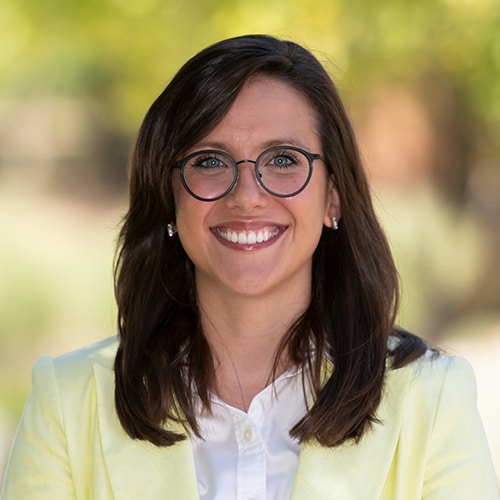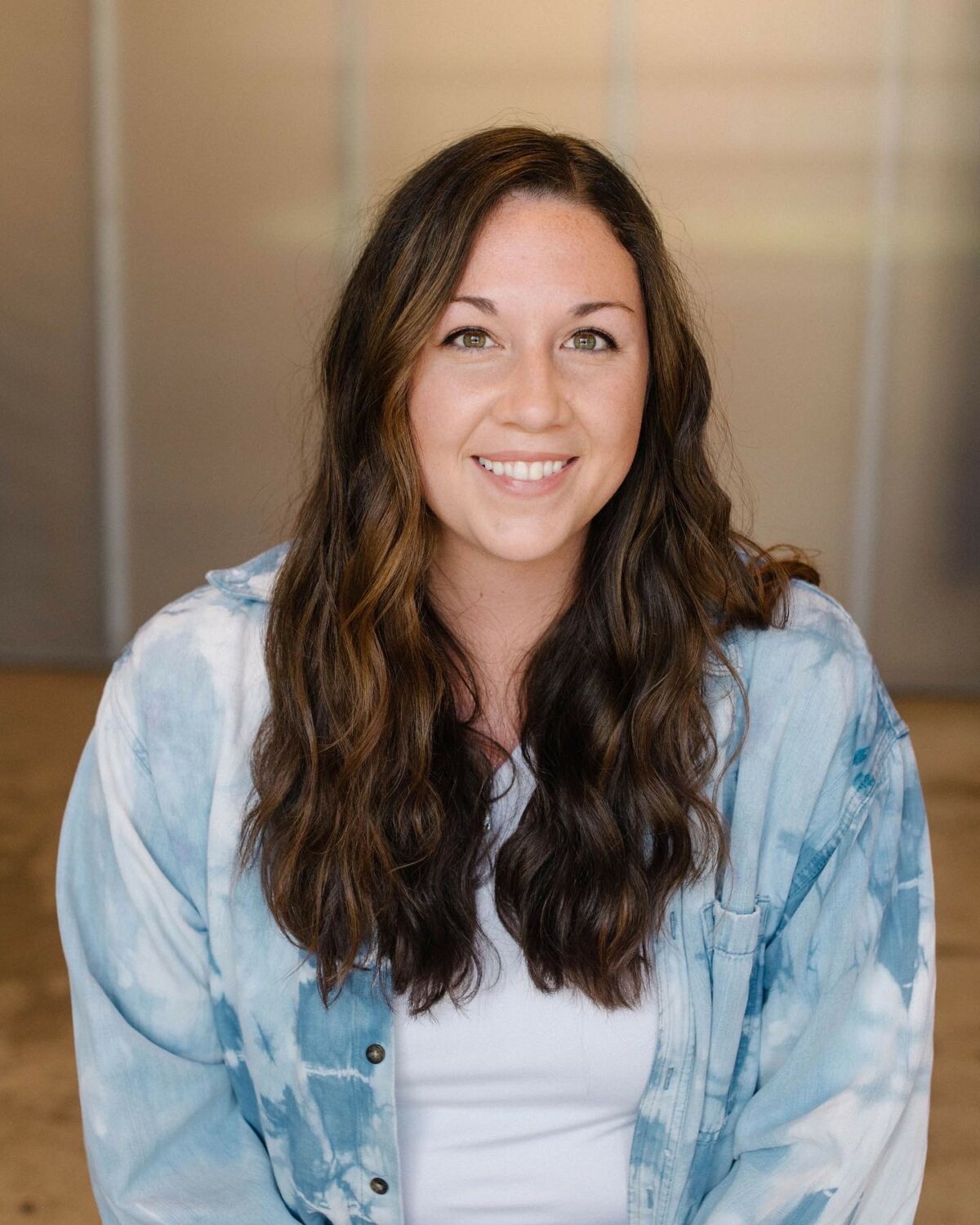
The theme of Des Moines University’s new doctor of occupational therapy program is building.
Applications for the first class, which begins in August, are being accepted for enrollment through June 9.
O.T.D. faculty have built a curriculum that offers unique advantages. Students choose one of two pathways – a traditional pathway, with most class and laboratory sessions held in person, and a hybrid pathway that allows students to engage in class sessions virtually and in laboratory sessions in person, generally two days per week.

“We want to meet the needs of diverse learners. The two pathways give students a level of flexibility that we know life requires,” says Diana Feldhacker, Ph.D., O.T.D., OTR/L, BCPR, LSVT-BIG Certified, program director and chair of the doctor of the occupational therapy department. “Both pathways ensure students will interact extensively with each other and our faculty and receive hands-on learning experiences.”
The university also is building a new campus in West Des Moines. Because DMU designed and constructed the campus on a “blank slate” of 88 acres of farmland, its facilities, technology and other features have been intentionally designed to enrich the learning environment for students in the university’s 10 graduate medical and health sciences programs.
O.T.D. students will use the teaching kitchen, home care laboratory space and simulation facilities to practice patient therapies in “safe learning environments that are real-life,” Feldhacker says. Clinical learning spaces will optimize case scenarios involving a variety of patients and conditions.

“Our faculty have contributed to designing aspects of the new campus in ways that are authentic to real people and real environments,” Feldhacker says.
Excitement also is building among new students in the program.
“I have felt so supported through the admission process,” says Haley Bird, a member of the inaugural O.T.D. class. She is an occupational therapy assistant at a central Iowa retirement community and wants to advance in the profession.
“I love being an O.T.A., but I’ve hit a cap and need more training,” she says. “I’m excited about the new campus, and that DMU is an all-graduate school really drew me as well.”
A Growing Profession
Occupational therapists are skilled health care professionals who help people of all ages who, for diverse reasons, have been impaired from doing the meaningful activities of daily life. They focus on physical, mental, emotional and spiritual factors that might impact an individual’s performance or participation in desired activities. Using a client-centered and collaborative approach, occupational therapists evaluate these factors and provide occupation-based interventions to improve health, wellness and quality of life.
The demand for occupational therapists in the United States is strong. The U.S. Department of Labor’s Bureau of Labor Statistics projects that employment of occupational therapists will increase by 17% between 2020 and 2030, faster than the average 12% growth for other health care practitioners. In addition, Iowa faces a significant shortage of occupational therapists. The Iowa Occupational Therapy Association notes current shortages in hospitals, schools and other agencies, as well as in rural areas. The state has approximately 1,000 licensed occupational therapists. According to IOTA, in 2018, 10 of the state’s 99 counties did not have a licensed occupational therapist.
“People need occupational therapy,” Bird says. “From basics like toileting and personal hygiene and from pediatric to neurological patients, there’s such a wide scope of what one can do with occupational therapy. On their lowest day, it’s what people need the most.”
Kaci Behrens, another student in DMU’s inaugural O.T.D. class, understands the value of occupational therapy from her experience as a volleyball player. As a junior on her high school team, she jammed her thumb but kept playing until it became painfully black and blue.
“I’d torn ligaments in my thumb, so I went to an occupational therapist. I loved the treatment my therapist provided,” she says. Long drawn to the health sciences, she began exploring the profession. Now a senior at William Jewell College in Liberty, Missouri – where she plays on the volleyball team – she believes occupational therapy is “the right place to be” – as is DMU.
“The new campus and its technology will be second to none. That’s a big reason DMU will help me further my education and career more than other schools,” she says. “The faculty are so knowledgeable and personable. I’ve had conversations with them about occupational therapy and life in general.”
Meet DMU’s O.T.D. Faculty
As the director of a brand-new O.T.D. program at DMU, Diana Feldhacker is excited about being part of a long-established medical and health sciences institution. DMU was founded in 1898.
“I feel so fortunate we have a great group of people to contribute to the positive and professional culture we’re creating,” she says. “They bring diverse expertise to the table. All are practicing occupational therapists with teaching experience, and they’re also really fun. Our students will be learning from the best.”
The program will eventually have 12 faculty members. Four currently are on board.
Feldhacker holds board certification in physical rehabilitation from the American Occupational Therapy Association and also has certifications in Lee Silverman Voice Training BIG, CarFit and the SOS Approach to Feeding. Her research focuses on occupational participation in a variety of populations and the scholarship of teaching and learning. A frequent presenter at professional conferences, she is a member of the World Federation of Occupational Therapists, the Coalition of Occupational Therapy Advocates for Diversity, the American Congress of Rehabilitation Medicine, the Iowa Occupational Therapy Association and the American Occupational Therapy Association. She has been a peer reviewer for scientific journals, including the International Journal of Human Rights and Healthcare, the American Journal of Occupational Therapy and the Journal of Occupational Science.
Kelsee Hove, O.T.D., OTR/L, CBIS, DRP, is the director of clinical education and assistant professor. Previously, she was an assistant professor of occupational therapy at Drake University and a clinical occupational therapist at On With Life. This central Iowa-based organization serves brain injury survivors. A certified brain injury specialist through the Brain Injury Association of America, she holds a Certificate in Driver Rehabilitation Therapy from the University of Florida and is Lee Silverman Voice Training BIG certified. Her research has focused on brain injury intervention, concussion management and driving rehabilitation. Hove serves on the Brain Injury Alliance of Iowa Board and the Mercy College Physical Therapy Assistant Program Advisory Committee.
Nicci Kuhl, O.T.D., OTR/L, CBIS, is the capstone coordinator and assistant professor. She has practiced in adult inpatient rehabilitation at MercyOne Des Moines Medical Center and MercyOne Clive Rehabilitation Center since 2011. She received an academic appointment at Drake University in 2019. A certified brain injury specialist, she continues to practice in adult inpatient rehabilitation and brain injury. Her research interests include professional identity formation, teaching and learning strategies, and clinical practice, including professional burnout, the effects of the COVID-19 pandemic and perceptions of the functional electrical stimulation (FES) cycle. Kuhl is the Iowa ambassador to the National Board for Certification in Occupational Therapy and the communications social media officer for the Brain Injury Interdisciplinary Special Interest Group for the American Congress of Rehabilitative Medicine. Kuhl was chair of the Education and Research Committee of the Iowa Occupational Therapy Association from 2019 to 2021 and has served as a reviewer for the American Occupational Therapy annual conference.
David Plutschack, O.T.D., OTR/L, BCPR, CLT, CEASII, is an associate professor. He has served as a clinical associate professor of occupational therapy and director of curriculum at Hanover College and an assistant professor of occupational therapy at Drake University. He is board-certified in occupational therapy and physical rehabilitation with specialty certifications in lymphedema, ergonomic assessment, functional capacity evaluation and Graston M1. Plutschack’s research has focused on the scholarship of teaching and learning, ergonomics, workplace experiences and upper extremity rehabilitation. He is vice chair of the Technology and Communications Committee of the American Society of Hand Therapists and is involved in the Iowa Occupational Therapy Association.

